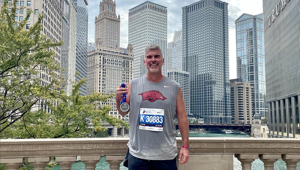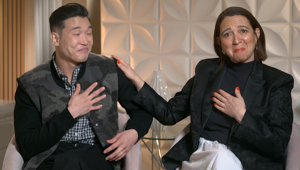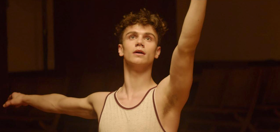This year marks the 400th anniversary of Shakespeare’s death, and to celebrate Rufus Wainwright is injecting the bard’s poetry with all-new life. On his ninth studio album Take All My Loves, the acclaimed singer-songwriter has set nine of Shakespeare’s sonnets to music, creating a pop dreamscape worthy of Titania and Oberon — not to mention A-list talents like Florence Welch, Carrie Fisher, Helena Bonham Carter and William Shatner, who all contribute vocals and spoken word recitations on the album. Queerty got on the phone with Wainwright last week and he told us all about the sonnets on Take All My Loves, why he’s restaging his Judy Garland tribute show at Carnegie Hall this summer, and his meet-cute with Welch at the Chateau Marmont.
Queerty: As a pop musician, what’s it like approaching a project like this?
Rufus Wainwright: Well, this is my second album on Deutsche Grammophon. They released my opera, Prima Donna, not so long ago. That was a completely classical project, but this one is a bit of everything, really. I don’t know, considering my propensities toward the world of opera especially and how I’ve managed to translate that into the pop genre, it’s a really nice pairing. On one hand they understand where I’m coming from and the influences that are at the core of my creation — operatic composers. But they also are excited about getting a new audience and, you know, being more in touch with what’s current — slightly. [Laughs] It’s a nice tradeoff because I think neither of us — neither Deutsche Grammophon nor I — are kind of like throwing the baby out with the bathwater. We’re more bathing the baby. And dressing it up!
Yeah, I expected the music on the album to have more Elizabethan influences.
No, I wouldn’t say that the Elizabethan musical vernacular is my expertise. I’m far more romantic, for sure.
Have you always been into Shakespeare?
Well, yeah. I think my mother took me to see Richard II or something — Richard III, whichever one it is — when I was four, and of course all I remember were the swords. But it’s always been around. When it really clicked was when I was around 12 or 13 and my dad took me to see A Midsummer Night’s Dream in Regency Park in London. There was just this one moment where I understood the language and the meaning. It was outdoors and it was a beautiful summer evening, and you know it was an incredibly inspiring experience.
How about we take this to the next level?
Our newsletter is like a refreshing cocktail (or mocktail) of LGBTQ+ entertainment and pop culture, served up with a side of eye-candy.
I saw your list of your 10 Favorite Books that you did for the New York Times a couple weeks ago and there was no Shakespeare on it…
No! No, I don’t really like reading him, per se. I like listening to him. I don’t think I’ve ever actually read — I mean, I may have read a couple of Shakespeare plays in high school, but it’s not something that I actually enjoy reading. I’d rather hear it read.
But Carrie Fisher was…
Yes! Well, she’s certainly a Shakespearian character, that’s for sure.
I was surprised to hear her on the album, but listening to her voice now, it has so much texture.
Yeah, I mean if you’re gonna look through the gamut of possible Shakespearian heroines, she’s done them all! In every sense of the word, whether it’s Titania or Lady MacBeth, she’s had so many different interesting lives. She should do a lot more Shakespeare actually because you can tell right away that the darkness within her kind of blooms in that language.
How did you go about assembling the vocalists for this album?
Most of it was kind very kind of off the cuff: whoever was available, whoever was in the same city where I was recording — cause some of the album I did in Berlin, some of it I did in London, and some of it I did in L.A. But there were a couple of definite goals and one of them was working with Florence Welch. I had met her at the Chateau Marmont a few years back. I was with my daughter and we were in the pool and she kind of dramatically walked onto the scene and jumped into the pool and my daughter thought it was Ariel from The Little Mermaid. So they ended up hanging out together and I knew right away that I wanted to do something with her after witnessing that vision.
Yeah, that’s a hell of a meet-cute.
Yes. It was magical. I guess I felt, yeah, if there was ever a Shakespearian idol it was her. Just the way she looks, in that very mystical way. And very Elizabethan, actually. And then of course there was the Berliner Ensemble, because that was where the piece originated from. I’m a very loyal man and I wanted them involved.
Talk to me about the process of choosing the sonnets. What were you looking for in the material?
Well, I wasn’t really looking for anything in particular. I strongly feel that you can take any nine Shakespearian sonnets at random and something fabulous will occur between those poems. They’re that well written. What I will say is that, I mean, “A Woman’s Face (Sonnet 20)” and also “Th’Expense of Spirit in a Waste of Shames,” those were two that I was very familiar with, “A Woman’s Face” being about the beauty of a young boy and “Th’Expense of Spirit” being about masturbation. [Laughs] So, I knew about those things! And then once we put the project together a few years ago in Berlin for the theatrical version of it, I had a lot of help from the dramaturge at the theater and a lot of other people. What ended up occurring on my album, which is really just luck, is that it turns out a lot of them are about dreams. The first sonnet is “When Most I Wink” which is about dreaming and falling asleep and really living your life in your dreams. And the last sonnet ends with waking up from that dream and realizing that you’re back in boring reality. I think there’s sort of a dream quality that allows for this album to make sense. It has a sort of surreal sense to it. It’s about being in a dream I think.
You’re also restaging your Rufus Does Judy show. It’s hard to believe it’s been 10 years since you did this show the first time.
I know. It’s horrifying actually.
What made you decide to revisit it?
Well, when I first performed it 10 years ago, essentially I had one year to put it all together and learn all the songs and all the lyrics, set up the interviews and hire the lighting. It was pretty rushed, and I think I did a pretty good job, considering. Now, Judy, when she did her concert in 1961, she’d been singing those songs for 40 years. So I felt it’d be nice to do the show again with a little time under my belt and a little more experience having lived with the material. Because when I first did it, afterwards I noticed a marked difference in my voice. My voice improved pretty profoundly, whether it was in terms of diction or also my pitch got better and also my breathing, and I really paid attention to that. It’s just a great exercise, you know, for the voice. And also, it’s just a hell of a lot of fun. And nobody else can do it but me! [Laughs]
Back to Shakespeare: Do you have a favorite film adaptation?
I would say…that I really enjoyed…I like Orson Welles doing MacBeth! You know, I’m pretty old school.
Not Baz Luhrmann’s Romeo & Juliet?
Yeah, well that we can do later at night, when I’m with the kids. [Laughs]























kevininbuffalo
I bought one of his cd’s once, he mumbles. I couldn’t understand a word!
martinbakman
Hope he tours So. Cal.
crowebobby
I’ll be 80 next year and one of the things I regret most in my life was missing the “Judy at Carnegie Hall” concert. I saw the posters in New York and for some unknown reason thought it was going to be a concert with Judy as just one of many performers. This was surely one of the most spectacular moments in show business history when you include the audience reactions. I saw Edith Piaf at Carnegie, which I feel certain was superior on the artistic and emotional level (I saw Judy at the Palace so I know what she was like in person), but I’ve never recovered from having missed the Judy concert for such an incredibly dumb reason.
Sammy Schlipshit
Rufus seems to be a nice enough guy but after attending one of his ‘concerts’ I feel accurate in saying it was a real snooze fest.
Each song sounded a lot like the previous.
Booooorrrrrrrring.
Little to no change in rhythm, tone, emotions.
I am really sorry I wasted my money.
I had such high expectations for his performance but sure as hell won’t make that mistake twice.
robho3
He does nothing for me
TrueWords
I am FAN!!!
https://www.youtube.com/watch?v=PBo-n_17XU0
TrueWords
https://www.youtube.com/watch?v=cAe1lVDbLf0
TrueWords
https://www.youtube.com/watch?v=mIF6f3tFxBw
TrueWords
AWESOME SONG!!!
https://www.youtube.com/watch?v=CtVyl402W5s
DCguy
Well at least he finally gave an interview without badmouthing the LGBT community.
martinbakman
@TrueWords: I agree TrueWords.
Would love to see his Xmas concert at the Ryman Auditorium.
OzJosh
Interesting that he talks about how much his voice improved singing the Garland material. I’ve tried and tried to listen and like his original songs, but his voice is nasal, his pitch is often off, and his diction is appalling. Yet, when he “sings Judy” he’s really rather good. I’m not sure whether it’s the fact that he’s vaguely imitating the performances of a much, much better singer, or whether it’s just a miracle what really good material will do. Maybe a bit of both.
bottom250
I love his music soooooooo much, sweethearts.
Curtispsf
I saw Rufus at the Davies Symphony Hall in San Francisco and visited with him backstage later. I found his performance to be incredible and he is also quite charming.
He BGB
Judy was born in 1922 so how could she have been singing these songs for 40 years in 1961? I agree with whoever said he mumbles. Singing that album does clear out your windpipes and vocal cords. I admire his courage. He could have looked really foolish if he flubbed those songs.